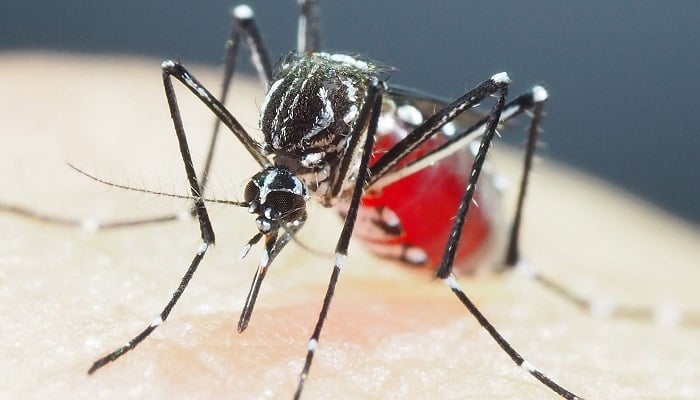Number of mosquito-borne diseases rise in Pakistan
WHO's Global Strategic Preparedness, Readiness, and Response Plan urges for a unified global effort
October 04, 2024

- Dengue cases have shot up in Pakistan this year.
- WHO has recorded 12.3mn dengue cases worldwide.
- Zika virus cases have been discovered in Karachi.
ISLAMABAD: As the prevailing climatic conditions after monsoon’s retreat coupled with urbanisation and poor sanitation created ideal environment for the spread of chikungunya, dengue, the Zika virus and malaria, Pakistan is facing growing number of mosquito-borne diseases, health experts and officials warned on Thursday.
The health authorities in Pakistan are trying to contain the outbreak, after the World Health Organisation (WHO)'s Global Strategic Preparedness, Readiness, and Response Plan (SPRP) urged for a unified global effort.
Dengue cases have shot up in Pakistan this year, especially in major cities like Islamabad, Lahore, Rawalpindi and Karachi. By August 2024, the WHO had recorded over 12.3 million cases of dengue worldwide. Pakistan was especially vulnerable because of its ideal climate, which includes temperatures between 26 and 29°C and humidity levels above 60%.
The Pakistan Meteorological Department (PMD) has identified that these conditions are favourable for growth of the Aedes aegypti mosquito — which is the main vector of dengue, chikungunya, and zika.
The District Health Office of Islamabad has escalated its efforts by instructing public to remove stagnant water, the breeding ground for mosquitoes. Health professionals caution that the real number of cases is probably underreported despite these efforts. More than 150 dengue samples are sent for testing every day in Rawalpindi, although provincial data is inconsistent with these alarming figures.
Alongside dengue, chikungunya — a virus that causes fever, joint pain, and rashes — is also spreading. The National Institute of Health (NIH) reports over 250 cases of chikungunya each week, though officials believe the actual numbers could be ten times higher due to the lack of PCR testing.
In Karachi, the discovery of Zika virus cases has raised additional alarm. Zika, which is especially dangerous for pregnant women, has the potential to cause severe birth defects like microcephaly. Although cases remain limited, public health officials are urging swift action to prevent Zika from spreading further.
The WHO's SPRP is a timely intervention, calling for a coordinated global response to tackle these growing threats. The plan emphasises five pillars for combating vector-borne diseases: emergency coordination, collaborative surveillance, community protection, scalable care, and improved access to treatments and vaccines. With dengue cases nearly doubling year-on-year since 2021, the SPRP’s focus on strengthening disease surveillance and vector control is crucial.
The framework also builds on the WHO’s Global Vector Control Response 2017-2030 and the Global Arbovirus Initiative launched in 2022. Both strategies emphasise innovative approaches to tackling the spread of vector-borne diseases, particularly in vulnerable countries like Pakistan.
In Pakistan, factors such as unplanned urbanisation, poor sanitation, and climate change have exacerbated the spread of mosquito-borne diseases. The accumulation of stagnant water from monsoon rains, combined with inadequate waste disposal and ineffective public health infrastructure, has made densely populated cities particularly susceptible. With dengue endemic in over 130 countries, Pakistan must urgently strengthen its public health response.
“The coming months are critical. The PMD data suggests that October, with its ideal temperature and humidity conditions, will be a high-risk period for outbreaks. The NIH has established a helpline (1033) to provide citizens with guidance on how to prevent outbreaks, while provincial health departments have issued advisories on maintaining clean surroundings and eliminating breeding grounds for mosquitoes,” an official at NIH said.
Health officials urged citizens to play their part by cooperating with fumigation teams, using mosquito repellents, and ensuring stagnant water is eliminated.
With climate change accelerating and urbanisation increasing, the risks of Aedes-borne diseases will continue to grow. The message from both global and local health authorities is clear: the time to act is now. Everyone—from government bodies to individuals—must contribute to safeguarding the health of their communities.
Originally published in The News









